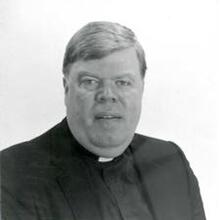There it was again.
I was concelebrating at a funeral Mass for a deceased Jesuit. The homilist praised the deceased for having “built a bridge between postmodern culture and the church.”
I was sitting in a tour bus in Miami. The tour guide asked us to look to our left at the Art Deco buildings in South Beach and then to our right at a new set of postmodern office buildings. I asked her what made the buildings postmodern. She said she didn’t know; the term was just part of the script.
In a review of my play, “Veiled,” a critic claimed that “Conley was trying to be postmodern but is barely premodern.” I’m still baffled.
When ecclesiastics exhort us to engage in the new evangelization, they almost inevitably urge us to evangelize postmodern culture, but it remains unclear just what we are supposed to evangelize.
Among the theorists of postmodernity, the French philosopher Jean-François Lyotard (1924–98) might be the most helpful in this regard. Not only does he indicate how the culture we live in differs from the one in which we began the 20th century; he can help us to identify postmodern traits of contemporary Catholicism itself as we attempt to proclaim the Gospel in a society which seems resistant to it.
According to Lyotard, one of the striking traits of postmodernity is the collapse of the great narratives that had dominated an earlier modernity. Rooted in the Enlightenment, these narratives insisted that humanity had finally come of age and was now advancing toward a new universal truth and happiness, thanks to the linear conquests of science and philosophically trained reason. Marxism and its political expression, Communism, were particularly powerful representatives of a crusading modernity convinced that truth could be contained within one all-inclusive system. The experience of world wars and totalitarian regimes, however, has destroyed the appeal of the old modern systems. The truth uncovered in the postmodern moment will be more local and tentative. Humility has returned as a noetic virtue.
Catholicism has also undergone a certain postmodern unhinging. On the eve of the Second Vatican Council, the neo-Thomism constructed in the late 19th and early 20th centuries still stood in place. In this ambitious philosophical system, every branch of philosophy and every philosophical thesis found a perfect integration and harmonious unity in the system’s architectonic structure. One of the great challenges to the dominant system was the nouvelle théologie, launched in France in the 1940s. At first glance, a “return to sources” hardly seems subversive. But a study of the sources quickly revealed that Irenaeus’s account of the fall differed from Augustine’s and that Anselm’s theory of the atonement clashed with the Council of Trent’s. The Cartesianized Thomism of the seminary manuals was no longer the master reference. Difference, discontinuity and contradiction replaced the unity and harmony of an earlier triumphal system that had carefully hidden its patches and gaps.
Even Pope John Paul II had his postmodern moments. In his encyclical “Fides et Ratio” (1998), the cross stands in judgment on all attempts to construct philosophical systems. “The crucified Son of God is the historic event upon which every attempt of the mind to construct an adequate explanation of the meaning of existence upon merely human argumentation comes to grief. The true keypoint, which challenges every philosophy, is Jesus Christ’s death on the cross. It is here that every attempt to reduce the Father’s saving plan to purely human logic is doomed to failure.”
The work of philosophical reflection continues vigorously in the church, but it now stands more clearly under the judgment of the cross’s sign of contradiction, which in its triumphant suffering exposes the pretentions of our threadbare metaphysical systems.
At its worst, the postmodern moment is a simple reversion to modernity at its most banal: subjectivism (“Here’s my story; this is my truth; accept it”) and relativism (“This is our story; this is our truth; period”). Such stances of sloth simply exclude critique, repentance and conversion. Doctrine becomes a matter of taste rather than of truth. But in its better episodes, the postmodern moment can point to the religious truth found in cacophony rather than harmony, the unresolved rather than the certain, the jagged rather than the perfect.








